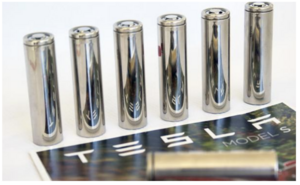
Due to the growing number of disposable Li-Ion rechargeable batteries used in electronic equipment such as cell phones, associated with risks to the environment, it is necessary to study efficient methods for recycling Li-Ion batteries. An example of this is that there are more than five billion mobile phones in the world, most of them with Li-Ion batteries, according to the analysis company of the mobile industry: Wireless Intelligence.
The technology applied to electronic equipment has developed very quickly, reducing the useful life of these devices, and causing an increase in the disposal of these products. Lithium-ion batteries consist of a cathode and an anode and there is a separator soaked in an organic solvent with lithium salts, which act as the electrolyte. The most used electrolytes are composed of lithium salts dissolved in organic carbonates together with some additives to improve their stability and increase safety. The presence of lithium salts in these batteries is due to the process of ionic conduction. It is these salts, dissolved in the electrolyte, that promote the transport of ions from the cathode to the anode (charge) and from the anode to the cathode (discharge). It is essential that these salts have the following main characteristics: high ionic conductivity and thermal and chemical stability.
Li-ion batteries are one of the fastest growing technologies in the United States, both in terms of scientific advancement of materials, and in growth of use by consumers. The challenge that the team has tackled is to design a first of its kind battery recycling plant, which will accommodate a variety of Li-ion battery materials as industry develops them and will be able to process a significant portion of the United States’ battery waste, even as the use of battery-powered vehicles grows over the next 20 years. In addition to limiting the waste produced by the transportation industry, this plant will benefit the United States as a raw material source. The U.S. is currently not a significant producer for any of the five main Li-ion battery materials: Lithium, Nickel, Graphite, Manganese, and Cobalt; a manufacturing plant of this size will limit the United States’ reliance on other countries for such materials.

